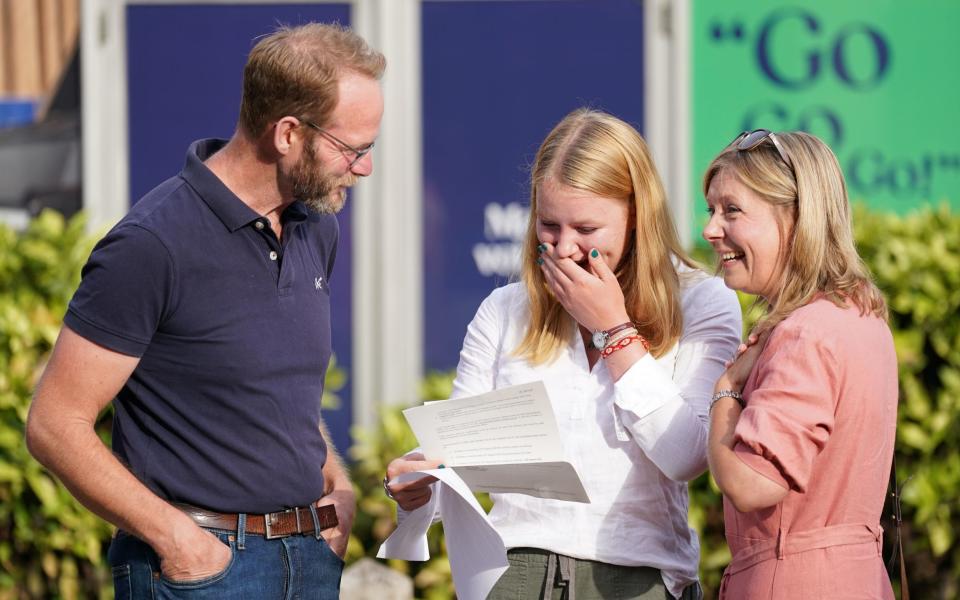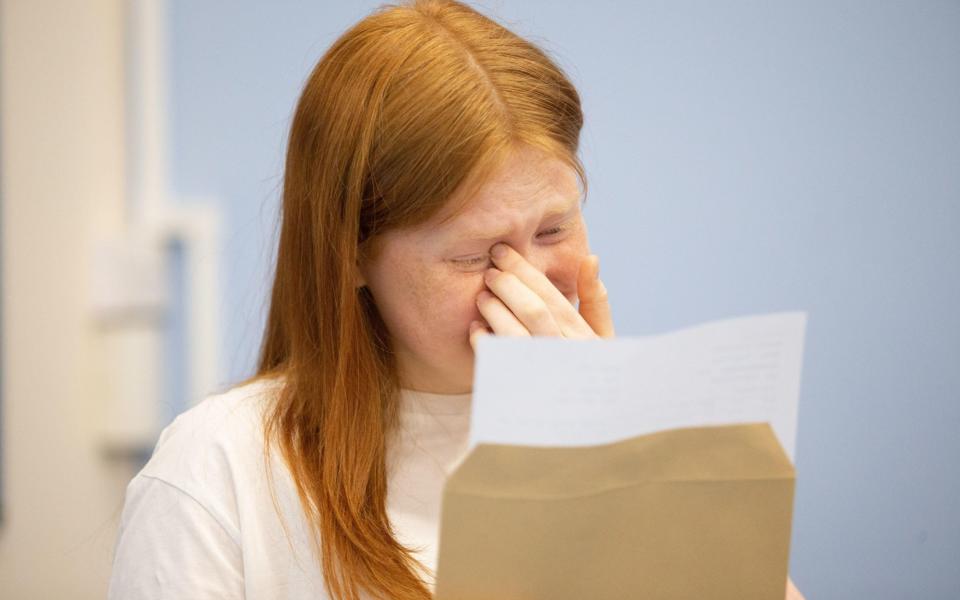A-level results: Students see biggest drop in top grades on record

Teenagers collecting their A-level results on Thursday have seen a record fall in top grades after sitting the first exams in three years.
Around 60,000 fewer A and A* grades have been awarded to this year’s cohort as the Government tries to clamp down on the record grade inflation during the pandemic when grades were assessed by teachers.
The proportion of A and A*s fell to 36.4 per cent, from a record 44.8 per cent in 2021. However, this was still higher than 2019, when 25.5 per cent of grades were A or A*.
James Cleverly, the Education Secretary, congratulated students this morning and acknowledged that they have had "a really tough time".
Every subject saw a decrease in the share of top grades awarded. The proportion of A and A*s in Maths fell by seven percentage points, while in English they decreased by 7.3 percentage points.
The biggest fallers were ICT, Music and Spanish, which fell by 15.1 percentage points, 12.5 percentage points and 12.2 percentage points respectively.
Teenagers received extra help with exams this year, such as advance sight of exam topics due to disruption to their education caused by the pandemic.
Grade boundaries were set in the middle of where they were in 2021 and 2019 as part of a planned two-year process to get back to pre-pandemic grade levels.

Independent schools in England saw a bigger drop in the proportion of top grades awarded than state schools. The proportion of A and A*s at those schools fell by 12.4 percentage points to 58 per cent.
At comprehensive schools, top grades fell by 8.7 percentage points to 30.7 per cent.
Extra help with exams for this year’s cohort seems to have favoured girls, with 37.4 per cent of female entries awarded A or A*, compared to 35.2 per cent of male entries.
However, the gender gap has closed compared to last year, when girls outperformed boys with teacher-assessed grades. In 2021, 46.9 per cent of female entries were awarded A or A*, compared to 42.1 per cent of male entries.
Boys only achieved relatively more top grades than girls in seven subjects out of the 39 with entries this year.
The largest female gender gap was in the Health and Social Care, where 30.4 percent of girls received an A or higher, versus 10.4 per cent of boys.

The largest male gender gap was in German, where boys received 62.6 per cent A or higher, versus 55.4 per cent for girls.
Meanwhile, the North-South divide in attainment has also widened during the pandemic, with teenagers in the South gaining a bigger lead.
This year, there was a 5.1 percentage point gap in the proportion of top grades awarded, down from 5.6 percentage points last year, but ahead of 2019, when the gap was 3.4 percentage points.
Pupils in Scotland received the results of their Higher examinations last week, with pass rates also down on last year but above pre-pandemic levels from 2019.

Teenagers now face a scramble for university places when clearing opens at 2pm today. Around 40 per cent of applicants are expected to try and find a place through the system.
More than 1,000 fewer courses have places available through clearing at the competitive Russell Group universities compared to last year.
UCAS, the UK admissions services, said that 19 per cent more 18-year-olds in the UK have gained a place at their firm or insurance choice, compared to 2019.
It added that 20,360 applicants found out on Thurday that they do not have a university place, down from 24,260 in 2019.

A total of 425,830 students are celebrating being accepted into university or college, 2 per cent lower than the record number seen in 2021.
Mr Cleverly told Sky News that the marking process has gone "according to plan" and there will be "lots of students, perhaps even the majority of students" will be able to get into their first-choice institution.
"That is why I congratulate them so much and we put adaptations in place so we made sure that the exams were fair, we gave greater spacing between the exams just in case students did contract Covid which put pressure on the marking bodies but they have stepped up to their responsibilities," he said.
"But funnily enough it was the students themselves who were most vocal in their desire to ensure that they had qualifications which were fair but robust and taken seriously both by institutions and employers."

 Yahoo Movies
Yahoo Movies 
